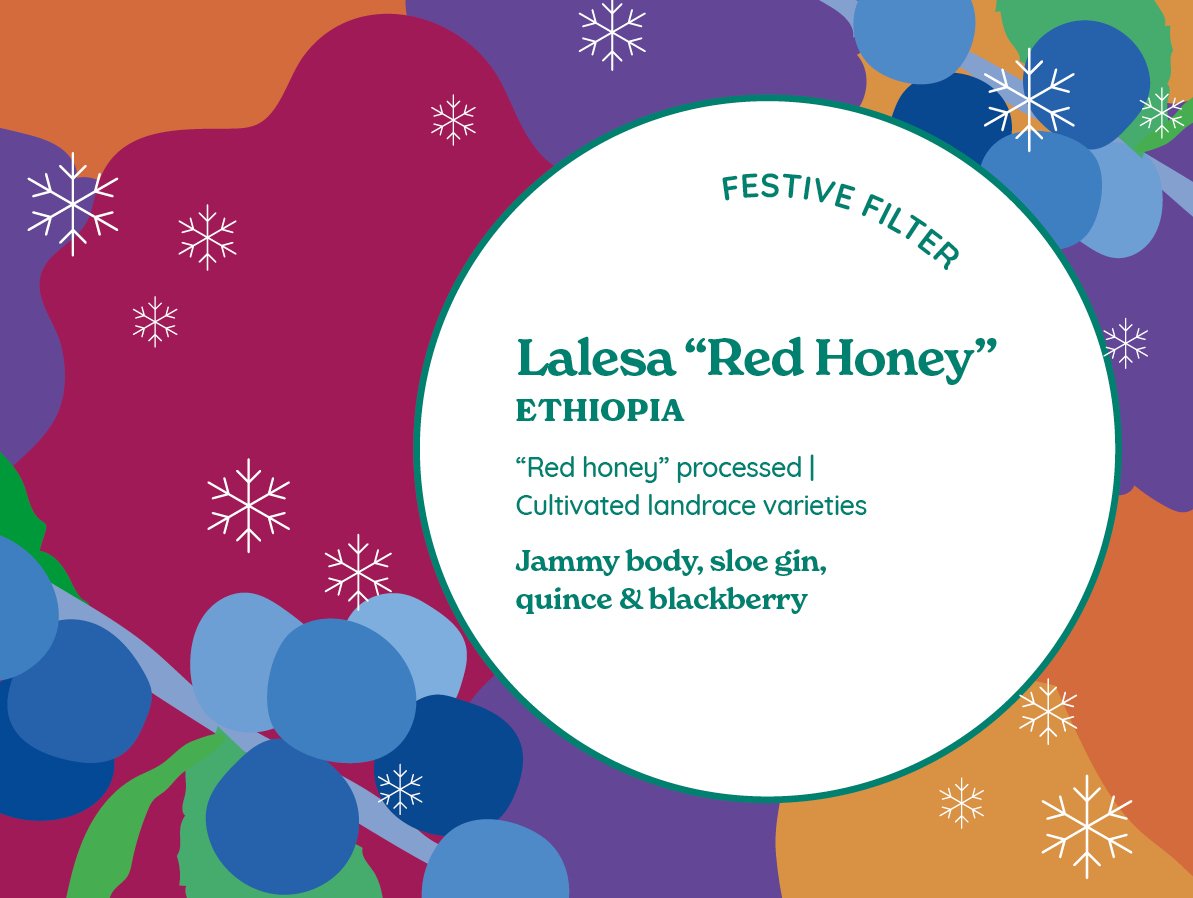Festive Filter: Lalesa (Red Honey) | Ethiopia
Key Origin Info:
Producer: Small-holder growers delivering cherry to Lalesa station
Processed at: Lalesa station owned and managed by Ephtah Speciality Coffee
Region: Gedeb, Gedeo Zone, Oromia region
Altitude: 2000 masl
Variety: Cultivated landrace varieties
Process: Sorted to remove floaters, dried in cherry for one day, de-pulped & dried on raised beds under shade for 13-18 days
Exporter: Ephtah Coffee | Importer: Falcon Speciality
Cup profile: Jammy, sloe gin, poached quince & blackberry
Purchasing history: 1st purchase of this particular coffee, 2 years from Epthah exporter
Bags of processed and milled coffee being loaded for export. Photo courtesy of Falcon Speciality.
More about Lalesa & Ephtah Coffee:
Lalesa is the key station operated by Ephtah Coffee, based in the Gedeb area of Guji Zone in southern Ethiopia, purchasing coffee from nearby small-holder growers. The farms are based at very high altitudes of up to 2200 masl and coffee plants are grown in under the shade of many trees, primarily false bananas trees whose leaves also serve as mulch and nitrogen fixers for the soil
Established and run by Wubit Bekele, Ephtah is a community focused exporter dedicated to building sustainable and collaborative supply chains that benefit customers, farmers, and their communities. The company emphasizes promoting the role of women in the coffee industry, recognizing their pivotal role in driving social and economic change in Ethiopia. Ephtah ensures quality at every stage of the shipment process, focusing on providing the highest quality green coffee beans and maintaining satisfaction among all stakeholders in the supply chain.
As Ephtah explains:
The majority of low paying seasonal labour is provided by women but very few farms are women owned. In addition, those farms are often less productive as women have less access to resources – primarily inputs, finance, and training. Our approach has two main pillars:
1. Providing women with the skills and knowledge to enhance economic empowerment - Ephtah provides training programs around production and quality analysis to help improve women’s knowledge and confidence. This often leads to an improvement in their access to finance which can lead to dramatic improvements in their standard of living.
2. Strengthening women’s voice and participation in decision making and leadership - Ephtah helps to create safe spaces for women in the communities we source from. We collaborate with local groups to encourage women in the community to become involved in local decision-making processes and leadership positions. Ephtah further supports women through the AMA Commitment with initiative including diversifying sources of income and running daycare centre for growers’ children during harvest time.
Lalesa station is Ephtah’s key processing station and the largest one if the Gedeb region. It employs 20 permanent staff and boasts 350 drying beds. During harvest the station provides income to further 250 seasonal workers.
This particular lot is processed as using their “red honey” method. The coffee is initially floated to remove floaters, then placed on drying beds for one day before being de-pulped the following day and then dried under shade for 14 to 18 days. The processing methods are chosen to maximize the intense, juicy flavors characteristic of this coffee. Once dried to the required moisture level, it is stored in the site warehouse before being moved to Addis Ababa for dry milling and finally to Djibouti via train for export.
After an initial introduction to Ephtah’s coffee last year, we are delighted to have been able to purchase four different lots form this socially driven exporter this year. And excitingly this very special lots lends itself perfectly to feature as this season’s Festive Filter and we couldn’t be more thrilled to finally share it with you!



